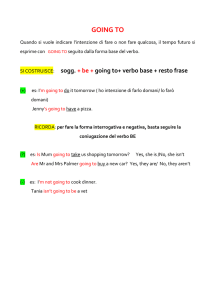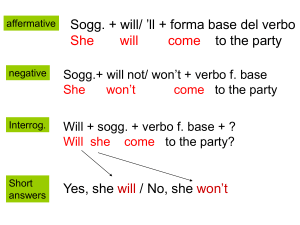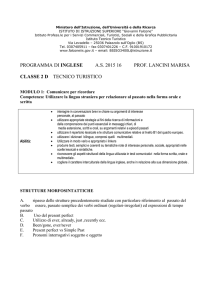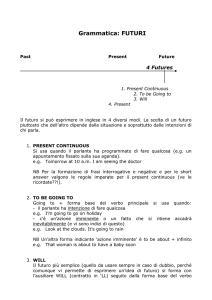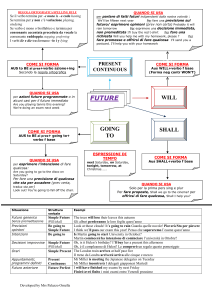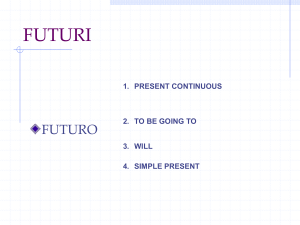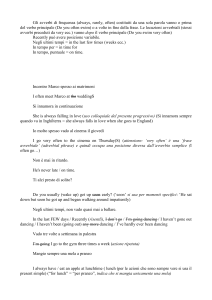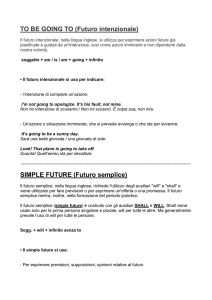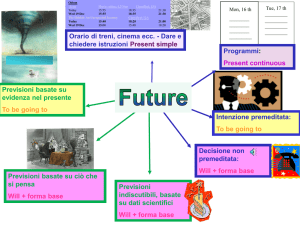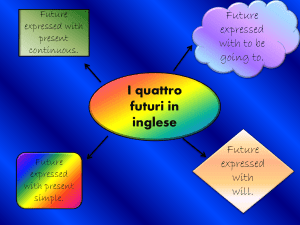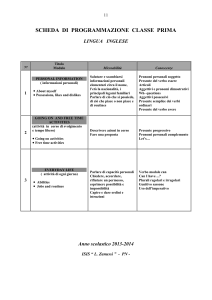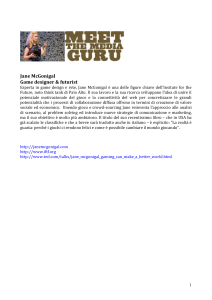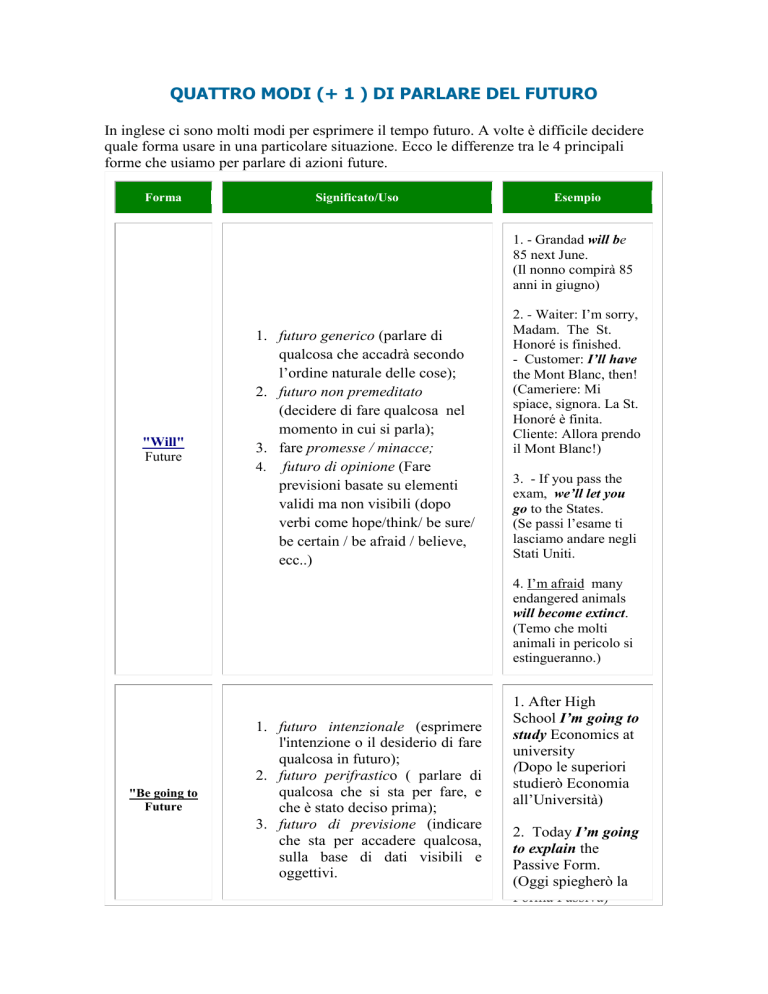
QUATTRO MODI (+ 1 ) DI PARLARE DEL FUTURO
In inglese ci sono molti modi per esprimere il tempo futuro. A volte è difficile decidere
quale forma usare in una particolare situazione. Ecco le differenze tra le 4 principali
forme che usiamo per parlare di azioni future.
Forma
Significato/Uso
Esempio
1. - Grandad will be
85 next June.
(Il nonno compirà 85
anni in giugno)
"Will"
Future
1. futuro generico (parlare di
qualcosa che accadrà secondo
l’ordine naturale delle cose);
2. futuro non premeditato
(decidere di fare qualcosa nel
momento in cui si parla);
3. fare promesse / minacce;
4. futuro di opinione (Fare
previsioni basate su elementi
validi ma non visibili (dopo
verbi come hope/think/ be sure/
be certain / be afraid / believe,
ecc..)
2. - Waiter: I’m sorry,
Madam. The St.
Honoré is finished.
- Customer: I’ll have
the Mont Blanc, then!
(Cameriere: Mi
spiace, signora. La St.
Honoré è finita.
Cliente: Allora prendo
il Mont Blanc!)
3. - If you pass the
exam, we’ll let you
go to the States.
(Se passi l’esame ti
lasciamo andare negli
Stati Uniti.
4. I’m afraid many
endangered animals
will become extinct.
(Temo che molti
animali in pericolo si
estingueranno.)
"Be going to
Future
1. futuro intenzionale (esprimere
l'intenzione o il desiderio di fare
qualcosa in futuro);
2. futuro perifrastico ( parlare di
qualcosa che si sta per fare, e
che è stato deciso prima);
3. futuro di previsione (indicare
che sta per accadere qualcosa,
sulla base di dati visibili e
oggettivi.
1. After High
School I’m going to
study Economics at
university
(Dopo le superiori
studierò Economia
all’Università)
2. Today I’m going
to explain the
Passive Form.
(Oggi spiegherò la
Forma Passiva)
3. It’s cloudy. It’s
going to rain.
(E’ nuvoloso,
pioverà)
- Debbie:
Present
Continuous
Future
Present
Simple
Future
*Shall/Will
Future
1. futuro programmato
(per parlare di eventi futuri certi,
vedi riferimento a un momento
futuro.)
1. parlare di un evento o
programma futuro (deciso da
altri e che si verificherà
indipendentemente dalla nostra
partecipazione).
a. Offrirsi di fare qualcosa;
b. Chiedere di fare qualcosa;
impartire ordini;
dare istruzioni
Shall we
meet tonight?
Tim: Sorry, I can't.
Tonight I'm playing
squash!
(Stasera ci vediamo?
Mi spiace. Stasera
gioco a squash!)
- This weekend,
Peter and I are
taking a few days’
holiday
(Questo weekend io
e Peter ci prendiamo
qualche giorno di
vacanza)
Tim: What time
does your flight
leave?
Sarah: It leaves at
7.45
(Tim: A che ora
parte il tuo volo?
Sarah: Parte alle
7.45)
a. Tim: Shall I get
you a drink?
(Ti porto qualcosa
da bere?)
b. Maitre:
Will you clear table
7, Paul?
(Maitre: Puoi
sbarazzare il tavolo
7, Paul?)
ESERCIZI
1. Will: riscrivi le seguenti frasi con will/won't e i suggerimenti dati, poi
decidi se si tratta di:
Decisioni immediate - Promesse - Minacce - Previsioni/Opinioni
personali
carry= portare; take=portare (accompagnare da qualche parte);
hit=colpire;
look after=occuparsi di qualcuno ; make things easy= rendere le cose
facili.
0. We / not win / the lottery = We won't win the lottery
(opinione/previsione)
1. I / not pass / my driving test=………………………………………
2. I / carry / that / for you=……………………………………………
3. We / take / her to the station=…………………………………….
4. I / not hit / him again=……………………………………………
5. I / look after / my dog/ for the rest of her life…………………….
6. We / not make / things easy for you=…………………………….
2. To be going to: completa le frasi seguenti con going to + il verbo tra
parentesi.
(I'm going to/ Am I going to? I'm not going to)
0. I …'m going to look for...(look for= cercare) a present for my mother=
Andrò a cercare(sto andando a cercare) un regalo per mia madre.
1. Stop asking. I…………………………..(not answer) your question=
Smettila di chiedere. Non risponderò(non ho intenzione di rispondere) alla tua
domanda.
2. Look! That car…………………………(crash=andare a sbattere)=Guarda!
Quella
macchina sta per andare a sbattere.
3. We……………………(work) hard this term. Studieremo sodo (intendiamo
studiare
sodo) questo trimestre.
4. ……………you……………..(work hard) this term?
5. Rick'es eyes are closing. He………………………..(fall
asleep=addormentarsi)
Rick sta chiudendo gli occhi. Sta per addormentarsi.
3. Present Continuous: progetti futuri certi (decisioni già prese)
Scegli un verbo e inseriscilo nella forma appropriata.
give=dare;
do= fare;
lay=suonare
leave= partire; meet= incontrare;
go=andare
0. I'm meeting John at 8 0'clock. We're going to the cinema
1. I can play the guitar quite well (=piuttosto bene).
I………………………in a concert next week.
2. A: What ………………you…………….tonight?
B: I………………….for the mountains.
3. ……………you…………………him the present tomorrow or next
week?
4. Jane………………..n't ………………..to the party next Sunday.
She's ill.
4. Traduzione
1. Ti manderò una cartolina da Londra (promessa)=
…………………………………………………………………………….
2. Cosa fai domenica prossima? (decisione già presa)
……………………………………………………………………………..
3. Inviterai John alla festa? (intenzione)
……………………………………………………………………………..
5. Going to or Will ?
going to
will
-plans
immediate
decisions
-when you
can see
what's
going to
happen
-scientific
predictions
Riempi gli spazi vuoti con il verbo tra parentesi. Usa la forma will o be
going to del futuro.
1
Sally: There's no milk left!
Betty: Oh. I _______________ some from the shop. (get)
2
The population of Valencia _______________ 2 million by the year
2010. (reach)
3
Mum: I told you to tidy up your room.
Son: Sorry, Mum, I forgot. I _______________ it after lunch.(do)
4
Sally: Why don't we meet for coffee on Friday morning?
Willy: Sorry. I can't. I _______________ the doctor then. (see)
5
"Tomorrow _______________ a bright and sunny day everywhere in
Spain, except in La Coruña," said the weatherwoman. (be)
6
Look at that big black cloud. I think it _______________ . (rain)
7
Sally: What are your plans for the week-end?
Betty: Brad Pitt phoned. We _______________ on a picnic. (go)
8
Betty: Have you booked the flights yet?
Sally: Don't worry. It's all organized. I _______________ to the travel
agent's tomorrow morning. (go)
9
In the future people _______________ bigger heads. (have)
10
If we miss the bus, we _______________ a taxi. (take)
11
Next month I _______________ a DVD player. (buy)
12
When _______________ you _______________ another party?
(have)
13
I've got to go to the dentist this morning. _______________ you
_______________ with me? (come)
14
Oh no! I think I _______________ . (sneeze)
15
Fanny: I can't open this jar.
Leslie: Give it to me. I _______________ it. (do)
6. Completa l’esercizio con una delle 4 forme di futuro
http://www.nspeak.com/newbasic/grammatica/4futuri.htm
7. QUATTRO FUTURI
http://www.nspeak.com/newbasic/grammatica/esercizio19.htm
1 Ron:"What are you doing this evening?"
Jane:"________ at home, because there is the
volleyball match on tv.
I stay
I'm going to stay
I'll stay
2 Ron:"What time is the English lesson tomorrow?"
Jane:"________ at 11.30."
It starts
It is going to start
It'll start
3 Jane:"Have you ever been to London?" Ron:"No, but
________ next week with my girlfriend."
I go
I'm going
I'll go
4 Jane:"There isn't bread at home" Ron:"Really?
________ some tomorrow.
I'm going to buy
I'll buy
I'm buying
5 Ron:"Are you free tomorrow evening?" Jane:"Yes.
Why?" Ron:"________ dinner at the Chinese
restaurant?"
Are we having
Shall we have
Are we going to have
6 Jane:"Where is the cinema?" Ron:"I don't know.
________ on the map."
I'm going to look
I'll look
I'm looking
7 Jane:"Have you decided where to go next Sunday?"
Ron:"Yes.________ to Milan.
I'll go
I go
I'm going
8 Ron:"Look! It's raining." Jane:"________ the
umbrella."
I'm taking
I'm going to take
I'll take
9 Ron:"What time does the train leave tomorrow?"
Jane:"________ at 9.15."
It leaves
It'll leave
It's going to leave
10 Ron:"John borrowed your bike" Jane:"Oh, no!
________ him, because I need it!"
I call
I'm calling
I'll call

